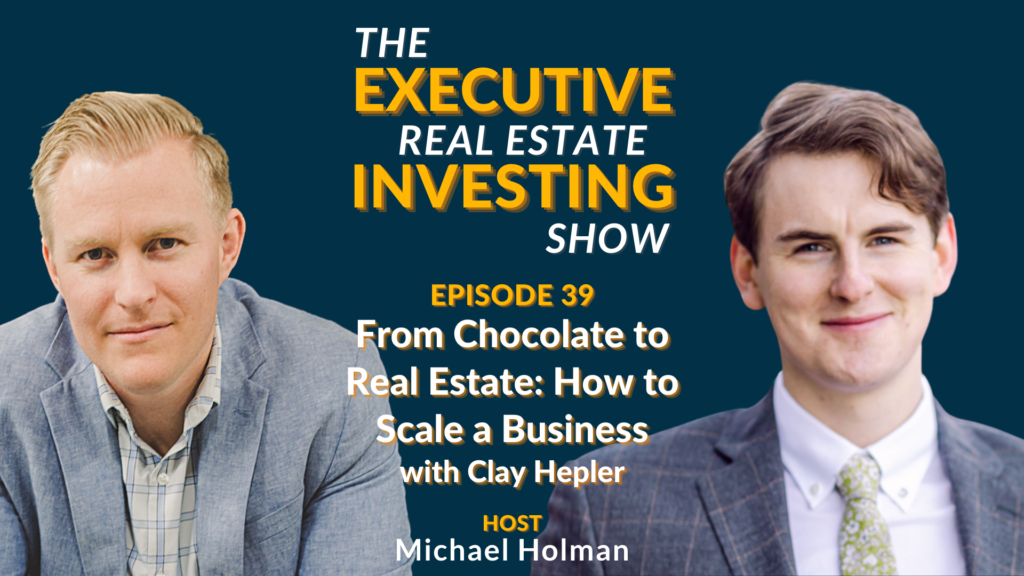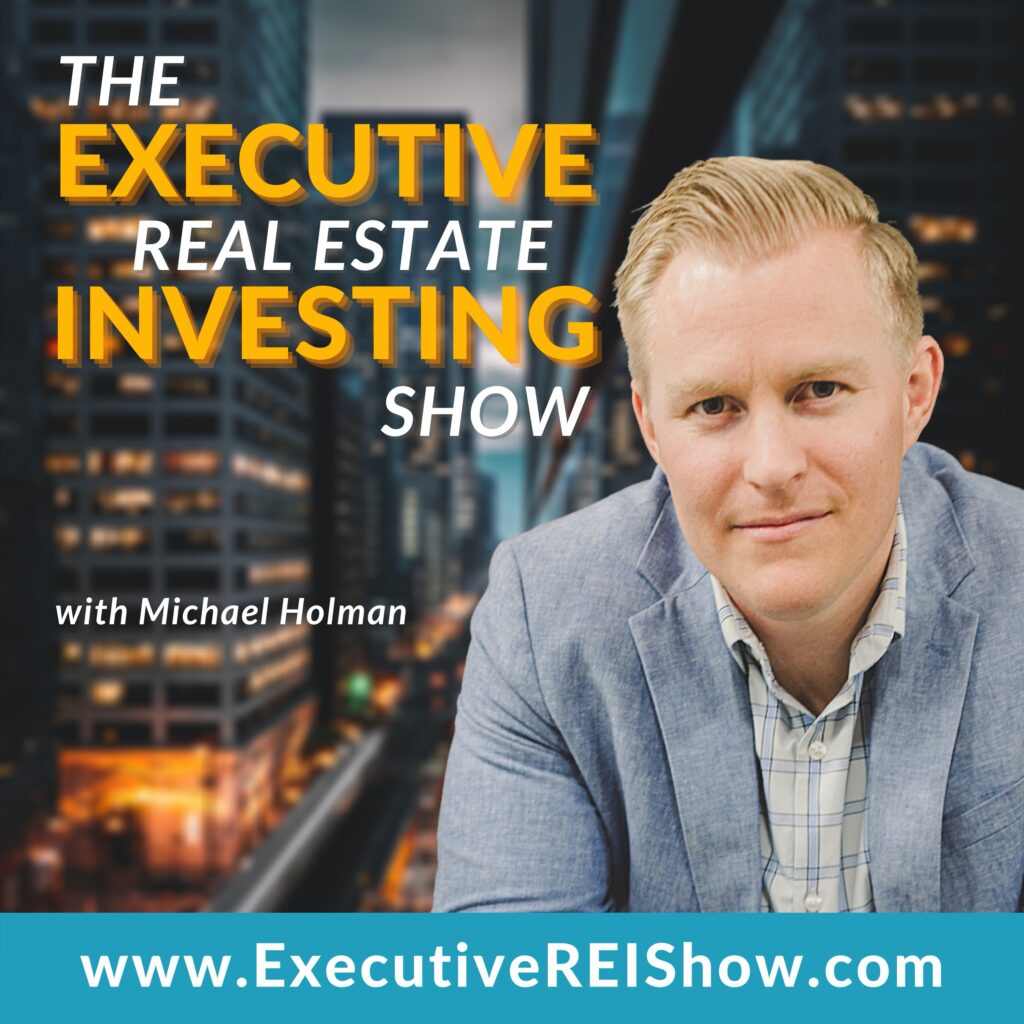
The executive Real estate investing Show
EPISODE 39
From Chocolate to Real Estate: How to Scale a Business with Clay Hepler
- March 7, 2022
EPISODE SUMMARY
This week on The Executive Real Estate Investing Show, host Michael Holman talks with Clay Hepler.
Clay thought he was destined to be a diplomat in South America. Then he actually moved to South America, and found out quickly that the diplomat life was not for him. So the young man pivoted to the family business—chocolate. And when he met a multi-millionaire real estate investor who was willing to mentor him, he was hooked. In just over a year’s time, Hepler has gotten a foothold in Pittsburgh’s Real Estate market. Starting with single-family, he’s just closed on a 13-unit apartment, and is expanding his portfolio with luxury Airbnb’s in Colorado.
Listen now as Clay talks about his early stumbles and the importance of finding the right mentor.
EXECUTIVE TIP
Expand Your Network
LISTEN TO THE PODCAST HERE

The Executive Real Estate Investing Show Podcast
EP 39: From Chocolate to Real Estate: How to Scale a Business with Clay Hepler
Listen on
READ THE TRANSCRIPT HERE
Note: Audio transcription has been automatically transcribed
Welcome to The Executive Real Estate Investing Show. This podcast is for you, the busy business owner or executive looking to create generational wealth. Here, we’re going to show you how to do that through real estate investing from multifamily to industrial and everything in between. You will become a real estate investing expert. And now, here’s your host, Michael Holman.
Michael Holman: Hello everyone, and welcome to another episode of the Executive Real Estate Investing Show your host Michael Holman. And we are excited to have you with us today. Today we have a special guest, Clay Hepler. He is a wealth consultant; he’s been investing in Real Estate. There’re two unique things that I love on this episode. Number one, he worked in a chocolate business with his family, which almost sounds like my dream job. Talking with him. He’s talking about making all those addicting chocolate. I can’t decide if it’d be good for me to work in a chocolate business, or most likely really, bad.
Working in a chocolate business I’d probably struggle with my health if I worked in chocolate business. But unique and it’s fun to listen to him talk about that experience. Number two, this is someone who, at a young age, over the course of over a year is gone from zero units to 13 units. We’re going to get into detail on what that is. What are the struggles? How did you get started? That’s a question that so many people have, how do I even get started in Real Estate? What do I do just to get that first deal? How is that even possible? We’re going to get into that and I love his responses throughout this conversation.
If you haven’t, little plug if you haven’t been there, go to www.ExecutiveREIShow.com. From there, you can get to the show notes. You can get a newsletter, you can ask an executive question all those fun things, go check out the website. Also hit subscribe if you’re listening on Apple, podcasts, Spotify, Stitcher, Google wherever, hit subscribe. Love gets you listening to the show on a regular basis, we got amazing guests that are always coming on. Really fun, exciting time, get you learning about Real Estate and business. It’s amazing. Hit subscribe, leave us a rating and review, we would love it.
As always, before we get into this interview, we are going to start with today’s executive tip. Today’s executive tip: Is it a time to expand your network. Call it a tip, I’m going to chastise you a little bit right now. Quit what you’re doing and go expand your network because guess what the relationships that you have, the network that you have is vital, it is critical. One of the things that you need to do on a regular basis. If you haven’t taken some time to strengthen or expand your network, it is time to pull your head out of the work sand.
Whether you are just moving and grooving on in your mechanic shop, whether you are just pounding the sales, whatever that is, I’m going to tell you, you need to take half a day, a day, pull your head out of that work sand go strengthen or expand your network. It will do wonders for you. Whether that’s take someone golfing, go to lunch with somebody, put on a little event, whatever you got to do, strengthen, and expand your network. It’s going to help you exponentially. Without further ado, we are going to get right into this interview with Clay Hepler.
Hello everyone and welcome to another episode of the Executive Real Estate Investing Show. As always, I’m your host Michael Holman and excited today to have Clay Hepler with us. Clay and I were just talking a little bit before we started recording on the show. He has been doing a lot. He’s a Pittsburgh native. He’s buying a luxury Airbnb in Colorado. He’s getting married in Spain next year. All sorts of cool things. Clay Welcome to the show.
Clay Hepler: Mike it is a pleasure to be here. I view time is the highest valuable resource. I appreciate the listeners number one listening to us and number two, you invited me on the show.
Michael Holman: We’re glad to have you Clay tell the listeners, tell the people who are watching the show a little bit about yourself.
Clay Hepler: I am a government dropout. My background was I was interested in becoming a diplomat specifically in Ambassador. My background was in US Latin American Bilateral Economic and Political relations. I was working for the US Embassy in Buenos Aires in Argentina, in South America, those who don’t know. I was thinking that this was going to be my path. I’m going to be Clay Hepler the ambassador and specifically in a Latin American speaking country because I speak Spanish. It was perfect until I got there. I was stamping passports and I was working with local NGOs and sort of micro entrepreneurs.
It was really a poor experience. As your listeners probably know, that business owners or executives, it wasn’t very meritocratic, it was very hierarchical. You have to put in five years, Mike to get to the next rank, and it wasn’t like input to output. Which I’m sure we’ll talk about today. Put in something and then you get an explosive return. I really didn’t like it. I was in college at that point and took time off college, and joined the family business, luxury chocolate, luxury toffee. I scaled the business from two to 42. states in 18 months.
Now, we were working with specialty shops, and in sort of mom and pops, like think about Whole Foods, but on a smaller scale. During that time, I met a guy that was worth about 120 million. I didn’t know what to say. It was a tremendously successful Real Estate entrepreneur, and business owner. He was a major metro in the East Coast. Maybe he took pity on me, maybe he was like, oh, this is the nicest young guy, I want to help him out. He told me about a family office structure. He told me about wealthy people operate differently, act differently. He showed me a team of advisors, like I didn’t know, you could have multiple attorneys, multiple accountants, people on your team that are on payroll that are helping you think more efficient, and effective about your decisions related to building wealth, maintaining wealth.
Specifically, when you’re a business owner, and you’re in that age of your life, you’re thinking about maintaining your wealth and passing on to the next generation. But he taught me a lot about business building, and I applied it to the context of the family business no longer involved. I decided that I wanted to get into Real Estate. I joined a firm locally in Pittsburgh, and started doing their acquisitions work, and then started buying stuff on my own. And all along took the mindset, the methods of my mentor and applied it and built my own financial consulting business as well, which is my full time gig. I know, that was a lot. But that’s where we are now
Michael Holman: Clay, you got so many things to dissect there. I am excited to even get started. But the one that I got to start with, is the one that everyone’s thinking. You met this person who was worth about $120 million. You talked about him talking to you. What did he tell you or advice that he gave you that stuck with you?
Clay Hepler: That’s a really good question. I think that when I reflect on our relationship. When you are young. I had this conversation with a friend of mine. We had dinner with him this past week, Mike and he came in, and he was talking to me about his brother. He’s in his late 20s, and his brother’s, like 16 years old. He was trying to talk to his brother about what’s going on in his brother’s life, his brother is struggling with something. He said, I just couldn’t relate to him, I couldn’t really speak to him on the same level. I feel like when I reflect, it was mostly my mentor, talking to me about concepts and ideas, and me questioning him.
Now it’s finally making sense to me, but I would say that the biggest thing I contextualize that. The biggest thing was, he stuck to what he knew best. He told me that a lot of times, he saw his friends that were going from this to another thing to another thing to another thing. He first started in Real Estate, he stayed in Real Estate.
Later when he aggregated a significant amount of capital, that’s when he diversified. But he focused on the Real Estate, business, everything related to the Real Estate business development. This is Washington DC, it’s a very competitive market and he grew that business and basically the biggest thing that he taught me was about staying focused, because when you get wealthier and wealthier, more opportunities come to you, and you have to stay focused on the one thing.
Michael Holman: I love it that, that almost sounds like the title of a book Clay.
Clay Hepler: I pull that right out of the Ether right there.
Michael Holman: It’s great book, by the way, in case anybody’s listening, go read it. It’s awesome. Well, Clay that’s interesting because I completely agree you see these people and it’s usually, at first, you have some people that just start off, it’s like, hey, I want to do everything all at once. I want to build an empire, and I’m trying to build an empire from day one. I’m going to do these 20 different things, if some people that are like that most people are okay, starting in a niche. They’ll start with what they know and it’s usually after that first big success, that first traction, the momentum, that’s when the wheels come off, just like you said, because all of a sudden, things open up, and it’s like, oh, well, I did this, and it worked.
Maybe I should follow this shiny object, and I’m going to go follow this shiny object and it’s usually after that first big success. That’s when I find that most people struggle the most, because they don’t want to stick with what they know. That’s when they want to say that worked well. They start getting this shiny object syndrome, where they start following all the different things. Next thing you know, they’re not even doing the one thing that got them to that point in the first place. I was even talking with my wife the other day, we drove past a billboard, there was a company that here in Utah has been successful. I saw these billboards, this company now adding this thing, and now adding that thing, and this was like six months ago, and I remember saying this is the start of the downfall for this company.
Because what they’ve done is they’ve taken what they were really good at and they just diversified into 3,4,5,6 other things all at once. It’s kind of funny, it was recently that this company had major layoffs. They just laid off something like 20, 30% of their employees. I wish I could predict the future like that more often. But it goes exactly to what you’re saying. I love that. One of the other things that I want to get into is we glossed over this chocolate business, that is a little unique. I think most of us would probably love to be in a chocolate business. Although I don’t think I’d be doing much business, I think be eating more chocolate than anything. Tell us about that. Talk about growing it from two to 42 states. Tell us how that experience was?
Clay Hepler: It was literally a mom and pop business, it was a family business. I don’t know, if I would give that much credit to myself, I was just a tenacious salesperson. I knew how to talk to people. I built relationships with essentially wholesale aggregators. I would build a relationship with a specific specialty shop that knew a bunch of other specialty shops in this area, or we went on tech platforms that you could put all your products on, and then it could distribute, and they get a commission. The way I approached it was first, I was one lane thinking, which was just cold call until you die. Cold call, which was $120 a day, which is great.
Then I realized that was a great way to do it. But the more effective way to do it, the leveraged way is to focus on how do I partner with people to really scale. For the first year, we probably went into 15 states, and we were ecstatic on the East Coast, and then we joined a couple of online aggregators. You put your products out, and they get a percentage of the commissions, we build strategic partnerships with them. And then we just exploded. Because we use other people’s networks and leveraged their networks to explode the business. That’s where it really took off because it was thinking not about just how can we do it, knocking on doors, it was like, how can we start to leverage other people’s relationship in a win, win manner, to really scale the business.
Michael Holman: There’s a couple of things and I think you are alluded to this. I got two follow up questions to that story. Number one, what was the most difficult aspect of the growth? If you had to pin it down to the one, maybe two most, what challenges did you face as you’re going through this time?
Clay Hepler: I would probably say, it’s the commodity aspect of the business. When you’re dealing with chocolate, you’re dealing with having to ship the inventory into your stores. You want to have time and in such a way that you have inventory in products and raw products, with a little amount of time as possible. Then you want to get it out the door as fast as possible. Because if you have product sitting, that’s costing you money. The biggest thing is when you grow very quickly three digits and triple digits in multiple years, you don’t really know how to handle that. So the organization of that was very difficult.
Michael Holman: I totally get it. This is something that we’ve been experiencing in our business not from a supply chain standpoint, but from an employee standpoint. When you have this hyper growth, that’s been our big thing. We’re constantly needing more employees, and we’re always balancing, hiring more people versus making sure that we’re not over hiring, and trying to balance that. All that talking that you just did about supply chains, just took me back to a supply chain class back in college. I’m sitting here thinking just in time manufacturing, and all these different things, but I love it.
These are interesting things and things that really apply to a lot of people that we talked to. The next question that I had related to this chocolate business, what do you feel like was and I think you alluded this. What do you feel was the fuel of fire? If you were to boil it down to hey, this, this was our secret sauce. What was that? Was it the taste of the chocolate, was it something else? What was it?
Clay Hepler: It’s frankly addicting. It’s really a good product. So again, I will say this, it made the scaling easy. One of the things I would do Mike is, I would send samples to people. I would find a bunch of specialty shops in a specific area, like New York City and I get all the high end specialty shops, and I would find out who the managers were and then I would ship them samples. $10, ship them samples of $15 and then we would get an order because it’s so addicting. It’s like crazy good. It wasn’t really a hard product to sell. Because it was gluten free, all natural ingredients, very high quality chocolate and addicted. It’s like chocolate dealer or drug dealer one of the two, they are similar. They’re interchangeable.
Michael Holman: Just try this you’ll never be able to stop.
Clay Hepler: People would call us, and they were like his is like crack cocaine, this is crazy. People would say that it’s crazy.
Michael Holman: Well Clay I’m sorry to tell you this but if it turns out that these are laced with cocaine, we probably can’t air this episode. I read your bio and went through some things, and I’d love to get into some of this Real Estate. You talked about buying, just before this we talked about buying a luxury Airbnb in Colorado. I know you have multiple units that you own. Talk to us about what you’re doing in the Real Estate world.
Clay Hepler: This is also with my own capital. We are under contract; I never like to as a Real Estate guy never like to say we’re going to close until we close. We’re under contract should close here by the end of March. I’m very hopeful because I think we got it for a great price and it’s a killer deal. I started my Real Estate journey like 13 months ago and I purchased 13 units all using my own cash. I did a house hack. Three units house hack. Then I bought another three unit then bought a single-family home burned both of those and then bought a six unit that we’re going to be able to burn all our capital out and some. I’m looking to continue to scale into larger multifamily properties in this area. That’s sort of my journey. I did it in a little over a year, all that stuff. I have a fiancé that’s tremendously good at making places look really good for great prices. I will say most of the success has to do with her in her eye and how to make places look awesome. That’s sort of in the Real Estate journey.
Michael Holman: Here’s the question that I have to ask because I get this question all the time and it’s different for every person. Everybody has their own journey. The number one question I get asked by these young aspiring Real Estate investors is I look at a home or some other Real Estate investments, how am I ever supposed to get the capital to be able to even do my first deal or second deal? It just seems so foreign, you come out of college or something like that. You might be making a good salary. Let’s say you’re making 50,75 and you can be making $100,000, right out of college. You got the solid salary, it’s like how am I ever going to get the capital that I need to go purchase a $300,000? rental property to get started in Real Estate. Talk to us about that very first deal. What did you do? Maybe the first and the second deal. How did you get this started, how did you get the trainer on?
Clay Hepler: We bought a three unit for $202,000. Put about 160 into it, this was through an FHA three and a half percent down loan, I think we had to come to closing with like $15,000, anyone could save $15,000 in a year, if you just disciplined. It appraised for 550. We created a tremendous amount of equity with just that first deal. We put a line of credit on it. My fiancé makes good money, I make good money, so we save aggressively, and we went out and bought another deal, we found a good deal. My question is, how can you afford not to do this? how can you afford not to buy Real Estate as soon as possible? Because we know that Real Estate, although there’s ups and downs, we know that the Federal Reserve’s printing money.
We know that inflation is at all time 40 years high, we know that asset prices are going up, people are seeking yield, and they’re finding it in Real Estate. People are going to get priced out soon, most people are going to get priced out soon. So, you got to get in on the action. I can talk about that. But there’s tremendous amounts of first-time homebuyer loan products that you can get 5% down three and a half percent down, even 0% down if you’re a veteran, or if you’re a USDA loan, you could find a single-family home and in the middle of nowhere, where you are, you can find like you see that mountain over there, you could just go right over there.
Michael Holman: I have to laugh because you go right down there, and you’re on the backside of one of the nicest ski resorts in Utah. You might not see USDA. Maybe another 100 miles that way, you’re definitely going to get there. Plenty of USDA property in Utah.
Clay Hepler: It is very easy to get in, I think that there’s just a limiting mindset around it.
Michael Holman: I completely agree and that’s one of the things that I see. There’s that old adage where there’s a will there’s a way, and I find that’s very true. Most of the time, it’s the mindset. It’s the sooner you break out of the mindset because you mentioned just a few of those and then you mentioned different loan options. You can partner with people, you can house hack, you can do all these different things to just get the ball rolling. You just got to get something started. It’s taking some sort of action. The one thing that I always have to tell people that I think you could attest to. Oftentimes, you get people who want to get started in Real Estate.
They’re looking at the person who’s been doing it for 10,20 30 years, who has capital, who has all the network and connections and everything that they need, and they’re just turning through giant deals all the time. It’s like, oh, it just feels like what they’re doing, they’re not even working. They work like 30 hours a week, I’m pretty sure. They’re doing all these amazing deals, and like that’s what I want, and they think, if I’m doing it right, then from day one, I shouldn’t be working 30 hours a week, and just making gobs of money and everybody’s going to want to do business with me and come to me. When you get started, you go got to understand you are at the bottom of the totem pole.
You’re going to give up more than you want to give up, you’re not going to make as much as you want to make, you’re going to spend way too much time on this, than you really should or need to. All those things, it’s going to be exponentially harder when you first get started. But at the same time, as you go along, those things get exponentially easier with every passing deal, with every passing investment. Every time you have another year of experience, every time you have another deal under your belt. I’d like to get your take on that, having scaled from just a single house hack up to 13 units. Do you feel it’s gotten easier from the first deal? Has it gotten harder? Has it stayed the same? How has that been for you?
Clay Hepler: Let me just touch on your earlier point. You go on Instagram, and you see the guy in the Bahamas working 20 hours a week with $200 million of Real Estate and bikini clad girls around him and Lamborghinis. Then you wonder is most of this person’s money that they have is it in Real Estate or is actually in coaching people how to start Real Estate. Most of the people that I know, that have been in the business for a long period of time, always talk about. There’s a really difficult time at the beginning of this whole journey. I think it gets easier. You’ve seen new deals every single day. They change. How you look at them like an Airbnb Mike is going to be really different than my six unit, that I’m renovating now, we’re going to do 600 to 800 to $1,500 on high night per night. $1,500 is like a month rent. It’s always changing. But when you think about getting the fundamentals down, that’s the most important thing. I think that a lot of times, you can attest to this. That people cloud what Real Estate investing really is. You got to buy a property for a price that makes sense.
You got to have the cash flow, pay for your debt, pay for your expenses, pay for your property management, pay for your taxes and your insurance. Now, the higher you go above that, the better the deal is. Now, if you want to go below that there are arguments to be made to go below that if you’re buying in a high appreciating area. Maybe like in Utah, or maybe in California, or maybe in the nicest area of your neighborhood, there could be an argument for that. I’m looking for cash flow right now, a little bit of appreciation. But there are so many ways to make money in Real Estate, it’s sort of like just pick one and stick to it and focus on it. Try to put yourself around people that have done it and stick to your numbers.
Michael Holman: I love that how you broke it down to really its simplest form there. Kind of a theme that we see throughout people that we’ve talked to it’s like look, oftentimes, it’s just getting started. We’ve been hiring a lot of new people and I often when I’m doing an interview with them, I always ask them the same question. Like hey look, we’re growing a lot. There’s a lot of new things happening, stuff that people haven’t even ever done. That just happens when you’re growing and you’re doing more and more. I always asked them that question.
Tell me about a time that you had a project or an assignment and when you got it, you looked at it like I got no idea how to do this and walk me through the steps on how you successfully completed that project or assignment. I asked every single person, regardless of who I’m hiring, every person who gets hired in Overland has been asked that question if they’ve been interviewed by me. The interesting thing that I find is through their responses, there’s a theme and they don’t even know there’s a theme. I can attest to this.
When you’re looking at something that you’re like, I have no idea how to do. It’s oftentimes that 10 to 20% at the very beginning, that is by far the hardest. It’s getting the knowledge and the information to do it. Once you have that, and it’s like, oh, now I know what to do. I just need to go do it. That next 70, 80% is oftentimes significantly easier. It’s that 10 to 20% that’s just getting past that hump that sets the stage for everything else. I think Real Estate investing is the exact same way. I think how you’ve described it in its simplest form, it removes some of the concerns and the worries that these first time Real Estate investors often have.
Clay Hepler: It’s easy, but it’s not simple. It’s fundamentals. But like what’s the difference between Kobe Bryant and other basketball players. We just focus on the fundamentals more. We focus on for example, Real Estate you underwrite more properties. In my business I need to talk to more people. For the cash flow management part of my business, I need to talk to more people, I need to be able to explain this better. Simplicity is a sign in my opinion of intelligence. If you can get the simple things right, looking at a deal, underwriting it properly, understanding that you got to cover your debt, you got to get a little bit above and the higher you get above, the better the deal.
It’s that simple. Everything else is included in that. Windows, I need new windows, I need a new roof. I need new boilers or HVA sheet, I need to put my renovation in there. But really, you’re looking at three points, cashflow, expenses, and then renovation. When you can find the combination of that, that gets the most amount of cash flow in a conservative way. And you’re making sure that you’re not super over leveraging, then you win, and you get a good deal.
Michael Holman: What for you through that journey on these on these 13 units. I’m going to ask that same question that I did with the chocolates. What was the most difficult thing, was it getting the first deal? Was it getting the biggest deal? Or was it something else? What was the most difficult thing through that process?
Clay Hepler: Dealing with the obsessive compulsion to buy more deals. As a Real Estate guy, you know what I’m talking about. The most difficult thing is honestly it’s very discouraging to look at so many deals, and not get a deal. To place so many offers. Real estate is easy. It’s simple. It’s not easy. The hardest part about it is it’s kind of boring. You look at so many deals, and you place so many offers. You just got to keep pushing through. The hardest part about it is really overcoming the disappointment of oh my gosh, another deal, offered on a 20 unit didn’t get that one, offered on an eight unit didn’t get that one, offered another five unit didn’t get it. Talk to this seller, that price is ridiculous. It’s really the disappointment, and that’s what I think kills a lot of Real Estate investors.
Michael Holman: I am laughing because that honestly, especially when you’re getting started at an early age and things like that, that is one of the hardest things. People oftentimes get so emotional, right at the beginning. They are like, I’m going to do it, let’s start, I’m excited to get invested into Real Estate, and all of a sudden, they either get overwhelmed or they think they found the perfect deal. I found it, I haven’t made any offers yet. But this is it. This is the one. You spend all this time daydreaming about it, you submit the offer, you’re waiting, you’re talking with the broker, you think it’s going to work and next thing, you know, the deal went to somebody else.
Emotionally that takes a toll on you, and you have the same mindset that the best salesman in the world have where no means nothing. No, isn’t a bad thing. It doesn’t mean that you failed, it’s just no and you try and work around it and if there’s not an option to work around it, you move on to the next one. That’s the skin that you have to build, depending on your process. But that’s what you have to do. I love that you say that because I think it outlines perfectly. One of the things that dissuades or discourages most first time Real Estate investors, but they don’t know or understand or realize it going into the Real Estate investing world.
Clay Hepler: I completely agree it’s with business like with my business currently, with other people’s businesses. It’s painted very attractively and really businesses; I think business is like 60 to 70% overhead and overhead is like the difficult stuff. The 30 or 40% of getting the deal done, getting that cash flow is the minority of your time, of your experience. The majority of it is doing the hard work, the necessary work to get the deals under contract. To scale your business to focus on marketing strategies, like how can I think differently about getting to this owner? How can I provide value in such a way that people are going to be attracted to my services or whatever it is? That’s the majority of business.
Michael Holman: Agreed, I love it. Alright, Clay we are going to wrap things up. We have two questions that we ask every single person who comes on this show and get ready first question, what is the best business advice that you were ever given?
Clay Hepler: The best business advice was really find something and commit fully to it. The Real Estate business for me I really love Real Estate, but my core business is a wealth consulting and I’m going full into that business. Real Estate is sort of this additional thing on the side and that’s why I think a lot of people for investing passively might be the right choice for a lot of people. Investing with proven operators is a really good thing because you’re going to produce more value focusing on a singular thing than you would if you’re sort of diversifying your focus into a variety of different things. There are arguments to be made there but that’s the best business advice I’ve ever gotten.
Michael Holman: Clay, what Real Estate investing advice would you give other business owners or business executives?
Clay Hepler: I would say the best Real Estate investing advice is you have to find people that have done what you’re aspiring to do, and you have to learn from them. There’s a lot of mistakes. If you’re all the way down on a low level like starting out with a single-family home for example, you got to know that knob and tube wiring is this is what it looks like, and you wouldn’t really know that unless you’re hand in hand with a mentor or someone like that. If you’re really high up and you’re buying multifamily apartment buildings big ones or self-storage or industrial or whatever. You want to make sure especially when you’re starting out that you’re aligned with someone that’s done this because you can really get yourself hurt with that
Michael Holman: Great advice from Clay. Clay how can people get in touch with you?
Clay Hepler: if you’re interested in just chatting about Real Estate, chatting about my wealth consulting business, you can reach me at Clay@creative- capitalist.com or reach me at creative- capitalist.com
Michael Holman: We will have all those in the show notes for anybody who’s listening and want to get a hold of Clay for wealth building, get a hold of Real Estate. You got any questions for Clay or you’re looking for a new best friend, Clay is your man. He’s going to help you. It’s been a pleasure talking to you Clay. Appreciate you coming on the show today.
Clay Hepler: I appreciate you having me. It’s been a great time.
Thank you for listening to The Executive Real Estate Investing Show. Ready to learn more? Go to ExecutiveREIShow.com for more episodes and resources to help you create generational wealth through real estate investing. That’s ExecutiveREIShow.com.
WATCH THE EPISODE HERE
MENTIONED IN THE SHOW
- Connect with Clay Hepler
- Website
- Creative Capitalist Podcast
EPISODE ARTICLE

Find Real Estate Success Through Focus, Drive, and Networking
You might think that chocolate and real estate have nothing to do with each other. But they are both fundamental pieces of Clay Hepler’s story, the guest on episode 39 of The Executive REI Show. They represent his business ventures, past and present, with a theme of focus, drive, and networking tying them together. Real estate investing has so much potential to create generational wealth—you know that if you’ve been around the show for a
EPISODE NOTES
- Clay is a self-described “government drop out.” He thought he was destined for a career as a diplomat in South America. His background is in U.S./Latin American bilateral economic and political relations. While still in college and working at the U.S. embassy in Buenos Aires, Argentina, he quickly found out that becoming a diplomat was going to take decades of hard work. “You have to put in five years to get to the next rung and then five more. And it wasn’t input to output.” The many long hours he was working weren’t yielding satisfying results.
- I was stamping passports and I was working with local NGOs and micro entrepreneurs, and it was really a poor experience.”
- So poor that Clay decided to take a step back from college. He returned home to Pennsylvania and started working at the family business of his girlfriend. “Its luxury chocolate, luxury toffee, and I scaled the business from 2 to 42 states in 18 months.” How did he do it? “I would send samples to people. I would find a bunch of specialty shops in a specific area like New York City, and I’d get all the higher end specialty shops, find out who the managers were and then I would ship them samples. And then we would get an order because it’s so addicting, it’s like crazy good.”
- Clay gives credit to the product over anything he did. “I was just a tenacious salesperson and I knew how to talk to people and I built relationships.”
- It was during his time at the chocolate shop that he made an important connection: a real estate investor worth upwards of $120MM. Clay’s curiosity was piqued. “He took pity on me. Maybe he was like ‘oh this is a tenacious young guy I wanna help him out,’ so he taught me a lot about a family office structure. He told me about how wealthy people just sort of operate differently. They sort of act differently.” Clay had found himself a mentor. Since Clay was a young man at the time, he admits that he probably wasn’t ready to process all of his mentor’s advice. “My mentor sort talked to me about concepts and ideas and I always questioned them. And now it’s sort of finally making sense to me.” It just took time.
- After building up the chocolate business, Clay decided it was time to venture into real estate. “I joined a firm locally in Pittsburgh and started doing their acquisitions work, and then just started buying stuff on my own.” He also started his own financial consulting firm.
- The best advice his mentor gave to him? Find something you are good at, and stick with it. “He first started in real estate, and he stayed in real estate. Later when he aggregated a significant amount of capital, that’s when he sort of diversified. But he focused on the real estate business and everything related to the real estate business, like development.”
- Michael agrees, and shares a story about overdiversifying. “I saw these billboards for how this company is now adding this thing, and now adding that thing, and this was like six months ago. And I remember saying to my wife, ‘you know this is the start of the downfall for this company, because they’ve taken what they were really good at and they just diversified into three, four, five, six other things all at once.’” That company has recently laid off 20-30% of their workforce.
- Clay’s first real estate venture began with house-hacking. “I purchased 13 units all using my own cash. I did a house hack, three unit house hack, then I bought another three unit, then bought a single family home.” He credits his fiancé’s ability to find good homes to buy. “She’s tremendously good at making places look really good for great prices.”
- Clay and his fiancé recenty purchased an Airbnb property in Colorado.
- How did Clay finance his first purchase? “We bought a three unit for $202,000 put about 160 into it. This is through an FHA three and a half percent down loan.” Which meant putting down $15k at closing. “Anyone could save $15,000 in a year if you’re just disciplined.”
- “My fiancé makes good money, I make good money, and so we saved aggressively and we went out and bought a good deal.”
- Any tips for finding the right property? Clay says “You have to buy property for a price that makes sense. You’ve got to have the cash flow, pay for your debt, pay for your expenses, pay for your property management, pay for your taxes and your insurance. Now the higher you go above that the better the deal is!”







